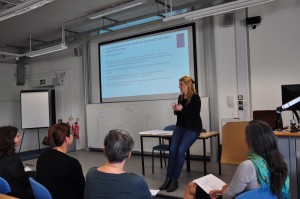Rebecca Peters is a 2014 Marshall Scholar currently a Water Science and Governance MSc candidate with King’s Water. She recently completed an MSc in Poverty and Economic Development at the University of Manchester focused on land use change, water governance, and irrigated agriculture in South Africa. Her previous research in Bolivia and Mexico as a Berkeley Law Human Rights Fellow and Blum Center for Developing Economies Fellow included peri-urban water access and rural sanitation issues. Here, Rebecca reflects on her experience at HH8 facilitating a human rights negotiation simulation.
Background
The inspiration for this session was came from a Harvard Law negotiation simulation for a transboundary water dispute that I attended in Fall 2012. As a current Water Science and Governance MSc candidate at KCL, I wanted to bring the experience of that simulation with deeper concepts of transboundary water justice. The simulation for the Human Rights and Water: Legal Mechanisms Protecting Water Access consequently focused on a Thai financed dam built on the Mekong River in Laos. The session, a simulated negotiation, developed to include non-state actors such as journalists, rural farmers who would be displaced by the dam, and the intergovernmental Mekong River Commission. This dynamic session encouraged critical thought from participants regarding the possibilities and limitations of human rights in advocating for access to water in a transboundary system.
There were four learning goals for participants of this simulation of a negotiated agreement for dam building along the Mekong River. First, we considered the types of human rights at stake when discussing hegemony, power, and transboundary waters – not just “right to water” but development, free speech, press, demonstration, clean environment, food security, and livelihoods. I directed the session to critically examine multiple forms of exercises of power beyond ‘the state’. Accordingly, the simulation emphasized that multiple kinds of knowledge from basin stakeholders must be incorporated to reach meaningful, lasting agreements to benefit as many people as possible. Lastly, ‘experts’ and powerful actors need to interact with all users throughout the negotiation process.
